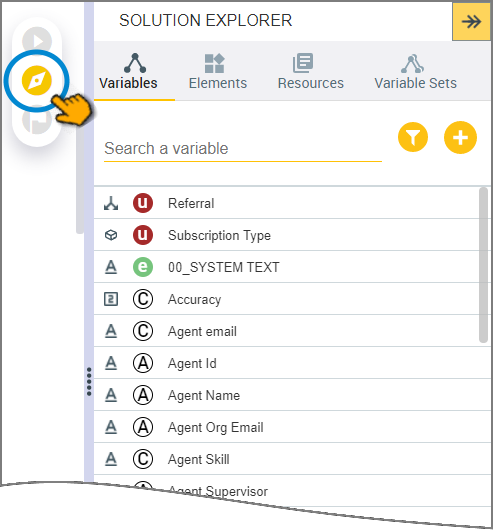Using Variables to Store Information
Variables are fundamental components that store different types of values, enabling the information to be available instantly to the currently running Flow as well as to other elements and activities.
X‑Platform provides numerous powerful and flexible ways to use variables in your workflows and applications.
Why Use Variables
Variables enable you to store pieces of information that are:
defined by you
entered by your customers
calculated by the Flow as it executes
retrieved from another source (e.g., an external database)
provided by an external service (e.g., a natural language processing engine)
Information that is stored in variables can be static (permanent) or temporary. An example of a static value is your company name or a fixed tax rate. An example of a temporary value is a phone number that is entered by a customer while visiting a help portal, or the name of the product currently being viewed by the customer.
Stored variable values can be retrieved anytime for use in your Flow. For example, when your customer Zoe purchases garden furniture online, a variable can store Zoe's name and another variable can store the product name. Using these variables, your thank you Flow text might read: "Thank you for your purchase Zoe. We hope you enjoy your new Garden Furniture."
On a more advanced level, you also can use variables to control and manage the progress of a Flow. For example:
Allocate Values to Variables. Use an Allocator to assign a variable a hard-coded value or the value from another variable.
Use Variables to Make Decisions in a Flow. Use variables in a Decision Point element to set conditions which determine process flow.
Use Uploaded Images in Your Flow. Use image type variables to store photos uploaded by customers, and then display one or more of these photos in a Paragraph, Resource, or email notification.
Reference Another Flow. Use the Sub-Flow element to map variables between the current Flow and another Flow.
Resolve Variable Conflicts. Use the Conflict Center to identify and resolve variable conflicts.
X‑Platform also enables you to use more complex variables that consist of collections of values, as well as Dynamic variables that use JSON objects.
Types of Variables
The X-Designer uses the following kinds of variables:
User Variables | Variables that you create in the X-Designer. They are only available for the Flow in which they were created. User Variables may have hard coded values, be allocated values, or derive their values from user input. For details, click here. |
Session Variables | Global variables that are supplied with X‑Platform or have been defined in the X-Console. They may be allocated with a hard coded or a dynamic value. Currently, there are two types of Session Variables that support two runtime scopes: Customer Sessions and Agent Sessions. For details, click here. |
Environment Variables | A special type of Session Variable whose value changes according to the current environment being used (i.e., DEV, TEST PROD). For details, click here. |
Variable Security
X‑Platform provides numerous options for securing variables while they are being used during runtime. For details, click here.
Viewing Variables
The Solution Explorer lists all User, Session and Environment Variables that are available for use in your Flow. For more information about accessing and working with this list, refer to Viewing and Managing Variables.
 |
Note
Session and Environment variables are also viewed and managed in the X-Console.